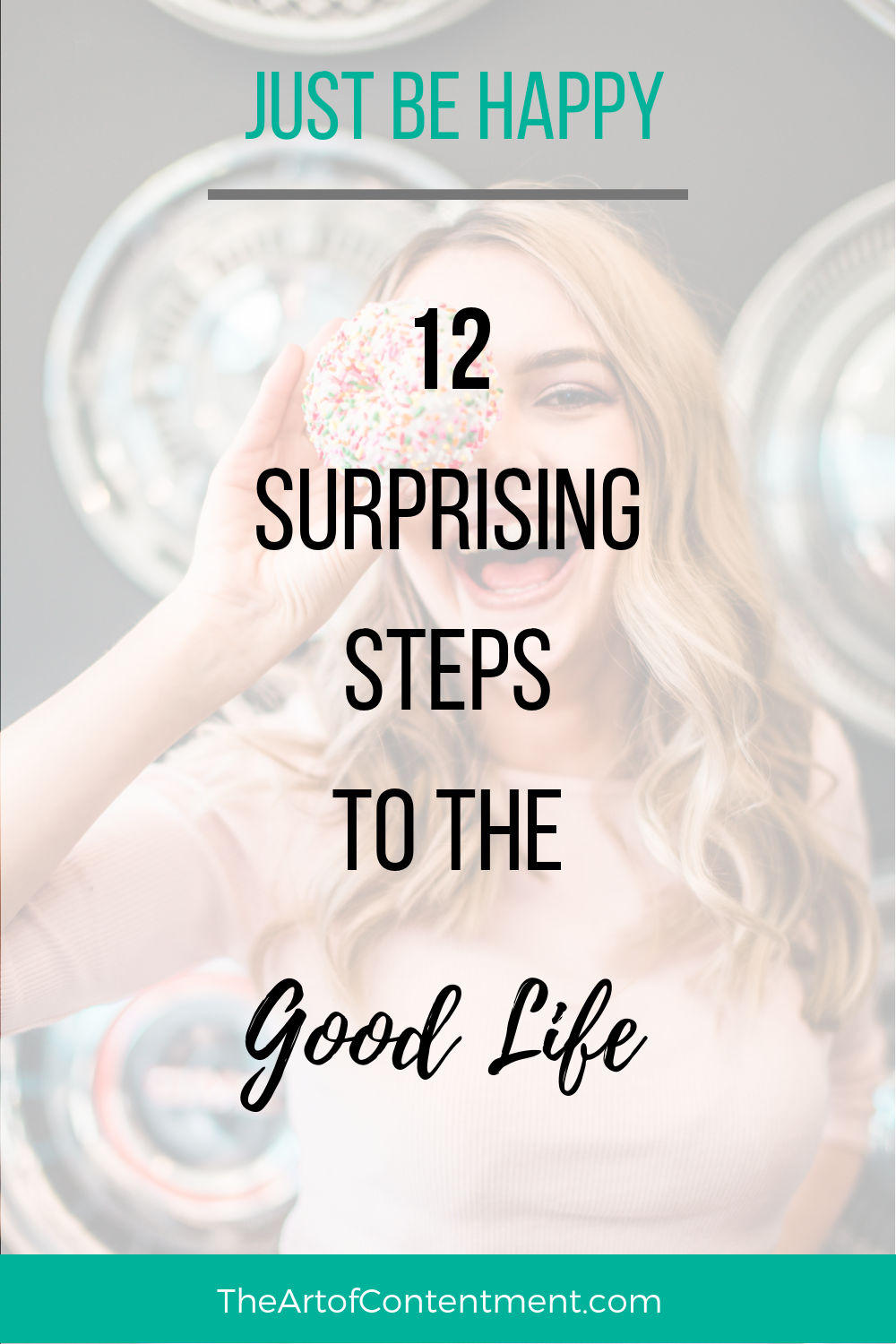What makes you happy? If you’ve the introduction in part 1, then skip the intro below and dig right into the happiness details!
How happy would you be if you won the lottery?
Probably about as happy as you are right now. That’s according to scientific studies in the relatively new field of happiness research.
Everyone wants to be happy. We fantasize about winning the lottery and imagine the house we would build with our new-found riches, or the vacation, or better yet, throwing that resignation letter on our boss’s desk and becoming a full-time artist.
We feel entitled to be happy. For Americans, it’s right there in the Constitution: “…life, liberty, and the pursuit of happiness.”
And when we’re not happy, we want to know why. And how to fix it.
You might even think you know what makes a person happy.
But what does the hard science say?
Thanks to the upsurge in happiness research since the year 2000, now we have a pretty good idea. I dug through research study reports and went half blind reading about statistics and control groups and trying to decipher the study authors’ convoluted, wordy, and overwritten prose. Heaps of research later, the results are in.
Maybe you already know many of the happiness secrets on this list, but some may surprise you.
In part 1, I listed four tips on being happier with your life. Let’s pick it up at number 5.
 5. Don’t try too hard: Low-exertion exercise.
5. Don’t try too hard: Low-exertion exercise.
Oh yes: LOW exertion exercise. Exercise is famous for its mood-boosting effects, but did you know that it doesn’t need to be high-intensity cardio?
That’s right, you can let that treadmill collect dust while you gain the same mood-enhancing benefits with gentler exercise, such as yoga, swimming, and meditation-led exercise.
In their study on mindful versus aerobic exercise modes, Yael Netz and Ronnie Lidor report: “…our results suggest that repetitive, low exertion rhythmical movements that are cognitively based may be more powerful in immediate mood enhancement than high-intensity rhythmical movements that are not cognitively focused.”
If that sounds like your kind of workout, look for exercises that feature
- Repetitive motion
- Low-exertion, rhythmical movements
- Cognitive basis
- A non-competitive environment
However, if you’re looking for cardiovascular benefits, you’ll still need to get your heart rate up with high-intensity exercise (sorry).
6. Tune it out: The joyful (re)percussions of music.
“When words fail, music speaks.” – Hans Christian Andersen
Music is a part of every culture in the world.
Mothers hum to babies in the womb. Children warble nursery rhymes. Teens sing to the car radio. Churches resound with hymns of worship. And who can imagine a wedding – in any culture – without music and dancing?
Music celebrates with you when you’re happy and commiserates with you when you’re angry; it soothes you when you’re brokenhearted.
It makes your life better.
It’s also one of the easiest ways to give yourself a peak experience.
Have you ever sat listening to music, eyes closed, head bobbing as song after song played on?
Your emotions soared and dipped with the notes and it felt like your mind was flying. When you finally came up for air, your emotions felt washed clean.
You’ve had a peak experience.
This kind of intense, transcendent experience is critical in the process of becoming who we are meant to be, a process Abraham Maslow (an acclaimed psychologist) called self-actualization. And music, according to Maslow, is one of the most common ways you can have peak experiences.
- Not surprisingly, music causes the brain to release feel-good chemicals. This rewards you for listening to music and makes you want to do it again.
- Music also affects your brain’s default mode network, making you more introspective. As you listen to music, you reflect on your innermost self and ruminate on memories and emotions that are relevant to the music.
Has a song ever brought back an old memory and filled you with nostalgia and longing? That’s the power of music over your brain.
So what kind of music should you listen to?
The kind you like.
Your brain is most affected by the music that appeals to you. Genre and lyrics (or lack thereof) don’t matter. So bob your head to R&B, roll with oldies, or croon to a country tune – it’s all good.
Music is one of life’s gifts, so enjoy it!
7. Collect experiences, not things.
Think back to your happiest Christmas. Why was it so wonderful?
Were you surrounded by family? Did you go somewhere special that year? Did you romp in the snow with your cousins and sit in front of the fire listening to the adults tell stories?
By the way, do you even remember what gifts you received that Christmas (unless you got a pony, in that case you’re excused)? Chances are you don’t.
What made that Christmas special was the experience, not gifts.
Despite our focus on acquiring stuff (personal finance guru Dave Ramsey calls it “stuffitis”, the compulsion to buy more and more things), the science shows that experiences bring greater happiness than material possessions.
Experiences give us memories that we can relive and share with others and that’s something that material possessions can’t do.
So what kinds of experiences will make you happier? Researchers have studied that, too.
“Happy activities” can be broken into two parts:
- One, activities that increase happiness are experiences that help you define yourself. Create memories that contribute to your self-defining narrative and become part of your autobiography – part of you. These experiences can be a milestone event, such as the day you became a mother, or something much simpler – reading a book that gave you an Aha! moment and helped you understand that weird little quirk of yours.
- Two, happy activities are experiences that strengthen your relationships with other people. Sitting down as a family for Sunday dinner, taking a walk with your spouse, or meeting your best friend for coffee are easy ways to enjoy your most important relationships – and brighten your day, too.
A 2011 study on leisure and happiness in the United States concluded: “Individuals who consider that their leisure activities enable them to become the person they are or to strengthen their relationships with others generally are happier than others.”
The study went on to list activities like shopping, reading books, getting together with relatives, and listening to music that increase happiness.
Strangely, going to the movies was associated with decreased happiness.
8. Savor ordinary moments and small pleasures.
If you’re worried that you’re losing your spark because you’d rather stay home and watch a movie with your husband than go river rafting this weekend, don’t worry – it’s normal.
In one study, researchers found that while extraordinary experiences – such as a vacation to Europe or the birth of a child – made both younger and older study participants equally happy, ordinary experiences led to greater happiness in older participants.
When you’re young, it seems like your life will go on forever.
- Happiness means experiences that are unique, exciting, and extraordinary, like graduation or surfing for the first time. You’re enthusiastic about meeting new people and trying new things.
- Because you as a young person don’t have a stable or clarified self-concept, you’ll seek these extraordinary experiences to help define yourself.
- And since you believe that you have an extensive future ahead of you, you pursue goals that help you prepare for your future.
But as you get older and perceive that your time is more limited, you might describe happiness as calmness, peacefulness, and tranquility.
- Your self-concept is clearly defined and you’ve lived through many milestone events and extraordinary experiences, so you’re no longer compelled to define yourself with extraordinary experiences.
- Now you give priority to your existing relationships and prefer activities and purchases that are calm and familiar. You pursue goals that will make you happy in the present.
This means that as you get older, you’ll be more likely to savor ordinary moments – and the ability to appreciate small pleasures will make you happier.
——————————————————————————————————————————–
You’re almost there! Happiness isn’t hard. It requires you to invest yourself in people and in activities you already enjoy. Here are a few ideas to think about:
- Low-exertion exercise is a treat for both your mind and your body. Find an exercise you enjoy and try it.
- Listen to music for peak experiences. Let it take you on a journey and leave you in a better place.
- Doing things, rather than buying things, will make your happiness last longer and will give you pleasurable memories that you can relive and share with others.
- Enjoy the small pleasures in life, like an engrossing book or a meaningful conversation with a friend. Life is made up of all these ordinary moments, so don’t miss them.
